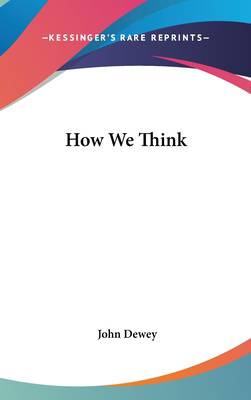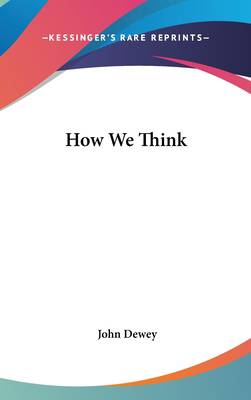
- Afhalen na 1 uur in een winkel met voorraad
- Gratis thuislevering in België vanaf € 30
- Ruim aanbod met 7 miljoen producten
- Afhalen na 1 uur in een winkel met voorraad
- Gratis thuislevering in België vanaf € 30
- Ruim aanbod met 7 miljoen producten
Zoeken
Omschrijving
""How We Think"" is a classic work of philosophy written by John Dewey, a prominent American philosopher and educational reformer. The book explores the nature of thinking and the processes by which we acquire knowledge, make judgments, and solve problems. Dewey argues that thinking is not a passive process, but an active one that involves experimentation, reflection, and the use of imagination. He also emphasizes the importance of context in shaping our thinking, and the role of social interaction and experience in the development of our intellectual abilities. Throughout the book, Dewey provides numerous examples and case studies to illustrate his ideas, and offers practical advice for improving our thinking skills. ""How We Think"" is a seminal work in the field of cognitive psychology and remains a valuable resource for anyone interested in the nature of thought and the process of learning.1910. Dewey, Professor of Philosophy in Columbia University writes: Our schools are troubled with a multiplication of studies, each in turn having its own multiplication of materials and principles. Our teachers find their tasks made heavier in that they have come to deal with pupils individually and not merely in mass. Unless these steps in advance are to end in distraction, some clue of unity, some principle that makes for simplification must be found. This book represents the conviction that the needed steadying and centralizing factor is found in adopting as the end of endeavor that attitude of mind, that habit of thought, which we call scientific. This scientific attitude of mind might, conceivably, be quite irrelevant to teaching children and youth. But this book also represents the conviction that such is not the case; that the native and unspoiled attitude of childhood, marked by ardent curiosity, fertile imagination, and love of experimental inquiry is near, very near, to the attitude of the scientific mind. See other titles by this author available from Kessinger Publishing.This scarce antiquarian book is a facsimile reprint of the old original and may contain some imperfections such as library marks and notations. Because we believe this work is culturally important, we have made it available as part of our commitment for protecting, preserving, and promoting the world's literature in affordable, high quality, modern editions, that are true to their original work.
Specificaties
Betrokkenen
- Auteur(s):
- Uitgeverij:
Inhoud
- Aantal bladzijden:
- 236
- Taal:
- Engels
Eigenschappen
- Productcode (EAN):
- 9781432606459
- Verschijningsdatum:
- 16/04/2004
- Uitvoering:
- Hardcover
- Formaat:
- Genaaid
- Afmetingen:
- 152 mm x 229 mm
- Gewicht:
- 517 g

Alleen bij Standaard Boekhandel
+ 116 punten op je klantenkaart van Standaard Boekhandel
Beoordelingen
We publiceren alleen reviews die voldoen aan de voorwaarden voor reviews. Bekijk onze voorwaarden voor reviews.








